We’re in the thick of mango season, which lasts from May to September. In this fruit-mad nation, that means mangoes are now being deployed indiscriminately in a variety of food and drink.
The two most popular mango varietals are the stout red-skinned Irwin (愛文), brought to Taiwan from Florida in 1954, and the slim yellow-skinned jinhuang (金煌), a local cultivar developed in Kaohsiung in 1980. While the former boasts more bombastic mango flavor, the latter is prized for its fleshiness.
Another common sight is the petite green-skinned indigenous mango (土芒果) that, despite its name, was introduced to Taiwan in the 16th century. The time-honored way of eating it is to treat the whole fruit like a naturally-derived juice box — pierce the flesh with a thick straw and roll the fruit in your palms to release the nectar. Unripe specimens are also used to make pickled green mango slices.
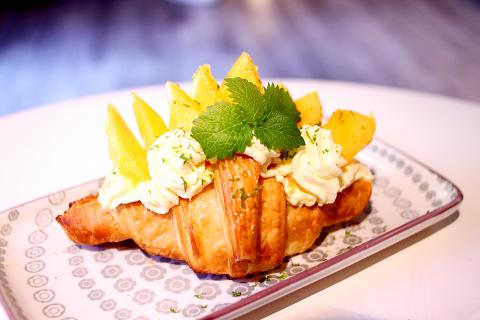
Photo: Davina Tham, Taipei Times
As if to confirm their place in the hearts and minds of the people, this year mangoes also received the dubious distinction of becoming a target of fake news.
Last month, news outlets picked up on rumors spread via social media alleging that a man landed in hospital with abdominal swelling and nausea two days after eating mangoes that had developed black spots on their skins.
The Executive Yuan’s Council of Agriculture eventually clarified that black spots on the skin do not affect the flesh of the fruit, and do not pose a health risk if they are peeled or cut off before consumption.
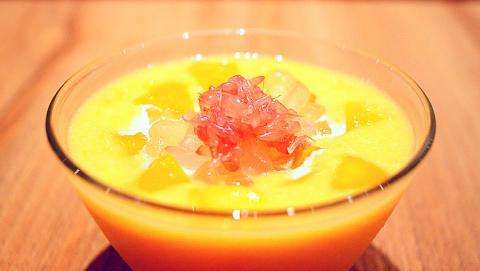
Photo: Davina Tham, Taipei Times
Now that this mango mischief is past, these are some sweeter ways to enjoy the fruit before the end of summer.
DESSERT STOMACH
Mango pomelo sago (楊枝甘露) is a nostalgic Cantonese concoction of chilled sweet mango juice and flesh, rounded out by sour and slightly bitter pomelo, with tasteless but chewy sago pearls providing textural contrast.
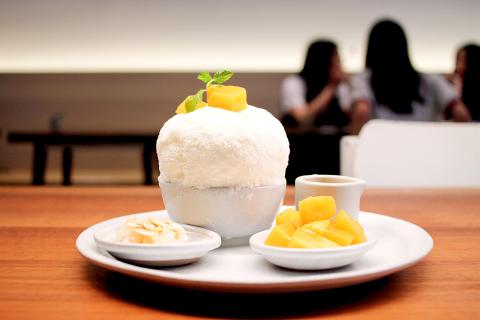
Photo: Davina Tham, Taipei Times
Mango pomelo sago was invented in the 1980s in Hong Kong, where it’s available year-round at dim sum joints and cha chaan teng or Cantonese diners.
Unlike other confections in which mango is only passing through as a special guest, this one is designed around the fruit. That makes it well thought-out and balanced — take any of the trio of ingredients out and the dessert falls flat.
Here, it’s a summertime-only offering at Dessert Stomach, which specializes in Hong Kong-style sweets. A basic bowl starts at NT$135 and can be embellished with sweet beancurd, mango ice-cream and coconut milk jelly.
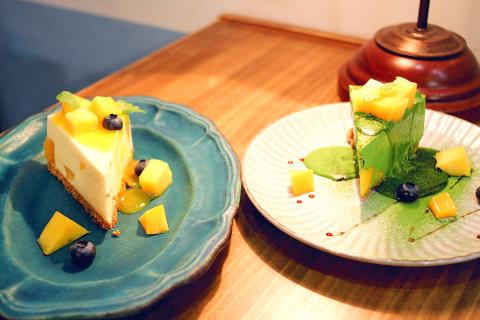
Photo: Davina Tham, Taipei Times
If that doesn’t convince you to have soup for dessert, fresh mango also does well on a bed of icy mango slush atop a classic Cantonese steamed milk pudding (NT$130).
■ Dessert Stomach (甜品胃); 13, Alley 32, Lane 216, Zhongxiao E Rd, Taipei City (台北市忠孝東路四段216巷32弄13號); open daily from 12:30pm to 10:30pm
CHEEVIT CHEEVA
Taiwan’s most famous mango shaved ice comes from the ubiquitous Ice Monster chain. But if you’re put off by the long queues or just want a change of pace, Korean bingsu by way of a Thai cafe is a refreshing alternative and one of the perks of globalization.
Seasonal mango shaved ice (NT$230) piles fresh mango cubes on an igloo of frozen milk flakes surrounding a core of more mango, with sticky rice and mango sauce on the side. These milk flakes melt on the tongue more like powdery snow than the icy shards of Taiwanese-style shaved ice.
Cheevit Cheeva’s shaved ice usually relies on a surprising filling to break the monotony — red velvet cake appears in its strawberry shaved ice. With mango, the instinct is that customers would probably just prefer more of the fruit while it’s at its peak. And while that may be true, this reviewer would not have turned down something a little more unpredictable.
The cafe’s airy shopfront near the Sun Yat-sen Memorial Hill is its only branch outside of Thailand and is almost always populated with millennials, influencers and food bloggers, who flock to its industrial-chic aesthetic featuring lots of gray cement and miniature indoor succulents to accompany the photogenic, snowball-like spheres of frozen milk.
The cafe has a knack for finding Thai flavors that will most appeal to locals. Another seasonal offering pairs salted egg yolk sauce and coconut milk on shaved ice (NT$230) with bualoy or Thai tapioca balls, which resemble the Taiwanese fenyuan (粉圓).
■ Cheevit Cheeva; 23, Lane 240, Guangfu S Rd, Taipei City (台北市光復南路240巷23號); open Friday to Tuesday from 12pm to 10pm and Wednesday to Thursday from 1pm to 10pm
CHAUSSON
This viennoiserie consistently churns out the city’s best croissants and chaussons — a filled French puff pastry.
Mango tiramisu croissant (NT$139) is a showstopper with slices of mango and lime mascarpone on top of a croissant filled with mangoes and pastry cream. Mango chausson (NT$75) is a simpler version of a turnover-like pastry filled with mangoes and pastry cream.
Though the croissants themselves are flawless, their yeasted and therefore slightly tangy pastry, however buttery and flaky, did not seem to this reviewer as natural an accompaniment to fresh fruit as a pie crust or sponge cake.
Pastry-lovers who enjoy durian — that pungent, custard-like Southeast Asian fruit — can also look forward to the durian chausson (NT$85), which is only available this summer.
■ Chausson (法式修頌.可頌專賣店); 183, Siwei Rd, Taipei City (台北市四維路183號); open daily from 7am to 5pm
EGGHOST
This is one of the more popular independent boutique cake shops around the city, which are invariably staffed by cats and filled with homely charm, comforting bakes and vintage furniture.
Egghost’s bakers have opted to include fresh mango in two existing desserts from their repertoire. Matcha rare cheesecake (NT$210) has a delicate mousse-like consistency that melts on contact. The matcha is left earthy and a touch bitter, deriving almost all its sweetness from fresh mangoes embedded within.
Mango Calpis cheesecake (NT$200) is made with the Japanese cultured milk drink, and hence carries a hint of tang from lactic fermentation. Some might find the cakes a little too dainty for their prices, but they are clearly made and plated with care.
■ Egghost (疍宅); 45, Lane 204, Songjiang Rd, Taipei City (台北市松江路204巷45號); open Wednesday to Sunday, 12pm to 8pm
DA YUNG’S
Like the 72 microseasons of the Japanese calendar, this local fruit juice and tea stand’s seasonal offerings are almost as sensitive an indicator of the passage of time.
This summer, mango is used in green tea (NT$60) and a frozen slushie (NT$75) — both made with real fruit. Orange, kiwi, dragonfruit and mulberry juices also provide an antidote to the heat.
■ Da Yung’s (大苑子); various locations listed at: dayungs.com.tw

The low voter turnout for the referendum on Aug. 23 shows that many Taiwanese are apathetic about nuclear energy, but there are long-term energy stakes involved that the public needs to grasp Taiwan faces an energy trilemma: soaring AI-driven demand, pressure to cut carbon and reliance on fragile fuel imports. But the nuclear referendum on Aug. 23 showed how little this registered with voters, many of whom neither see the long game nor grasp the stakes. Volunteer referendum worker Vivian Chen (陳薇安) put it bluntly: “I’ve seen many people asking what they’re voting for when they arrive to vote. They cast their vote without even doing any research.” Imagine Taiwanese voters invited to a poker table. The bet looked simple — yes or no — yet most never showed. More than two-thirds of those

In the run-up to the referendum on re-opening Pingtung County’s Ma-anshan Nuclear Power Plant last month, the media inundated us with explainers. A favorite factoid of the international media, endlessly recycled, was that Taiwan has no energy reserves for a blockade, thus necessitating re-opening the nuclear plants. As presented by the Chinese-language CommonWealth Magazine, it runs: “According to the US Department of Commerce International Trade Administration, 97.73 percent of Taiwan’s energy is imported, and estimates are that Taiwan has only 11 days of reserves available in the event of a blockade.” This factoid is not an outright lie — that

Former Chinese Nationalist Party (KMT) chairwoman Hung Hsiu-chu’s (洪秀柱) attendance at the Chinese Communist Party’s (CPP) “Chinese People’s War of Resistance Against Japanese Aggression and the World Anti-Fascist War” parade in Beijing is infuriating, embarrassing and insulting to nearly everyone in Taiwan, and Taiwan’s friends and allies. She is also ripping off bandages and pouring salt into old wounds. In the process she managed to tie both the KMT and the Democratic Progressive Party (DPP) into uncomfortable knots. The KMT continues to honor their heroic fighters, who defended China against the invading Japanese Empire, which inflicted unimaginable horrors on the
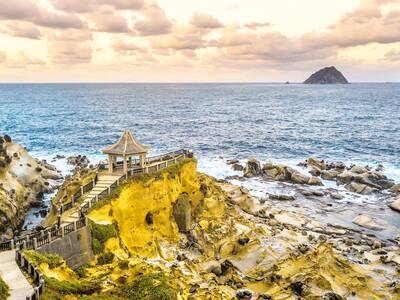
Sitting on a bus bound for Heping Island (和平島), at the start of my first visit to Keelung in years, I was hell-bent on visiting a place of considerable historical interest, even though I knew that it wasn’t officially open to the public. In 2011, archaeologists working in the densely populated southern half of the island unearthed the foundations of the Convento de Todos los Santos (Convent of All Saints, 諸聖教堂), a Catholic house of worship established during Spain’s 1624-1642 occupation of northern Taiwan. I’d heard about its rediscovery a while ago, but it wasn’t until I read a scholarly